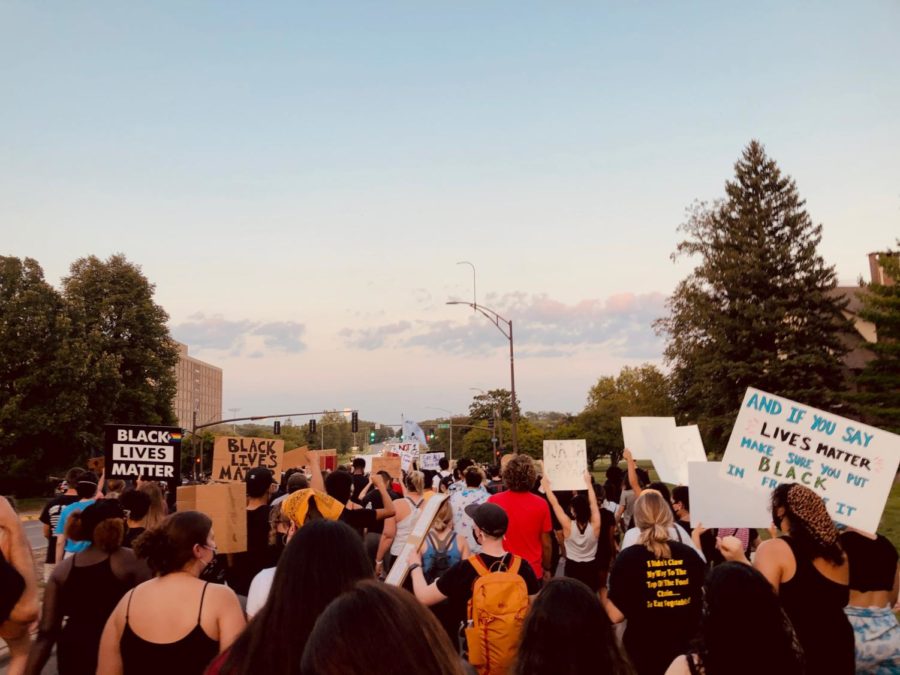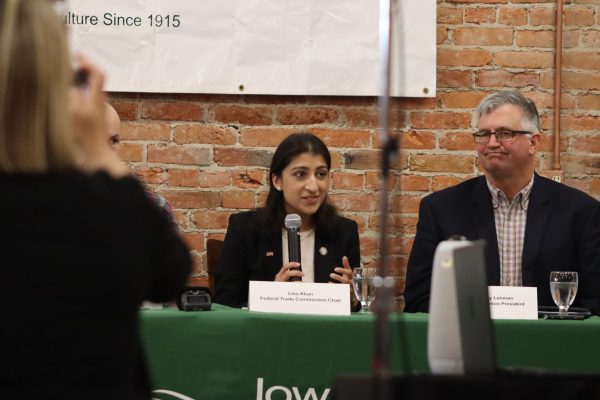- News
- News / Diversity
- News / Politics And Administration
- News / Politics And Administration / State
- News / State
- News / Student Life
A closer look at First Amendment rights and protests
July 7, 2021
On June 17, the American Civil Liberties Union of Iowa (ACLU) spoke out about the passage of Senate File 342, which is a bill that would elevate penalties for unlawful protesters and raise qualified immunity for Iowa police officers.
Frequent protestors and First Amendment advocates alike had thoughts about this bill and questioned the reasoning for its creation in relation to protests held by Black Lives Matter, to which many have said the bill is a response.
In the ACLU of Iowa statement, Executive Director Mark Stringer said this law is taking the state of Iowa in the wrong direction. In the statement addressing the bill’s passage, Stringer said he sees the formation of this law as an attack on Iowans’ First Amendment rights.
“It gives police even less accountability by codifying broad immunity for many state law claims brought by those who are harmed by police actions. It also stiffens criminal penalties for certain types of protest-related offenses. And it creates an entire new penalty for people who are attending a lawful protest that turns unlawful, and don’t leave in time,” Stringer’s statement said.
Stringer and the ACLU of Iowa is not the only one to see the enactment of this bill as a contradiction to the right as Americans to peacefully protest. Senior Fellow for the First Amendment at the Freedom Forum and former President Gene Policinski said he sees this law passing as a conservative push, which is being seen across the country as a reaction to Black Lives Matter protests.
“I think [Conservative lawmakers] are frankly hiding under the name of safety and security in preventing violence, but you know, we already have existing laws in almost every case to deal with those issues,” Policinski said.
Policinski said that he thinks bills such as these come in two types of camps in the reasoning for their creation. He said many of these legislators know the bills won’t stand constitutional scrutiny in courts, but they are still sending a message to constituents.
“These to me seem to be more in two camps: One is the old-fashioned ‘get elected’ bill. They know in some cases, these bills are outrageous and don’t have a chance to stand constitutional scrutiny in courts, but they can go to the next election and say, ‘I tried to defend you’ and play to their base,” Policinski said. “The second thing is more dangerous because I think they’re actually unAmerican. I think this is a country born in protest. We have traditionally gone into the streets to peacefully protest and let governments know in between elections we don’t like what they’re doing.”
Policinski said he sees these types of bills as an attempt to “chill” the protesting that is being seen in our country. They can be seen as a fear tactic to keep protestors from going out and utilizing their First Amendment rights.
“I think some of these laws and some aspects of the laws in Iowa are a little more than attempts to stifle protests, to stifle the public from letting their voice be heard because politicians and others are uncomfortable hearing those messages,” Policinski said.
It was pointed out that these bills can be quite effective at keeping the public quiet about their concerns and grievances due to many logical aspects, such as the fact that the penalties involved can hurt protesters financially, create a longer legal process to go through and even potentially hurt employment opportunities.
“It’s utterly ridiculous, and it’s a waste of taxpayer money, but it’s going to make some people feel good and it’s going to help some people get elected,” Policinski said.
Avid protester for Black Lives Matter and member of Sigma Lambda Gamma at Iowa State Somerle Rhiner expressed she was unfortunately unsurprised about the passage of SF342 because she thinks elected officials in Iowa are prone to erasing the voices and messages that need to be heard.
With regard to the way Rhiner thinks the enactment of this bill will affect protest turnout, she still expects protesters to take to the streets, regardless of consequence.
“I still think we’re going to have big numbers. I think that we already know the consequences from last summer when people were literally taking photos of us and had drones flying above us and people were getting locked up for just literally being at a protest. We know the consequences when we’re doing these things,” Rhiner said.
Rhiner said she thinks this will affect the people who are already on the fence about attending protests, but the loyal protesters who will fight as hard as possible to make change will not let anything stop them from using their First Amendment rights.
This is one of many bills seen throughout the country that are examples of ways to impact protesters’ decisions to use their constitutional rights, and organizations such as Ames BLM and the ACLU of Iowa will continue to use their voices regardless of such enactments.

















